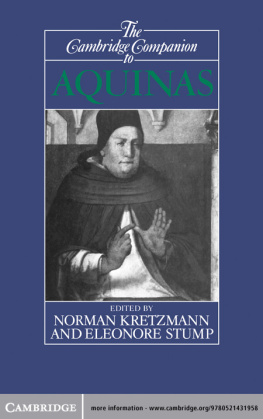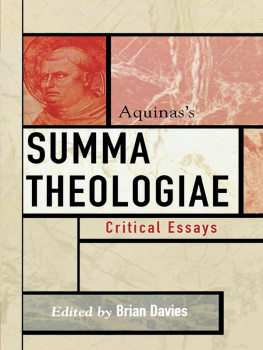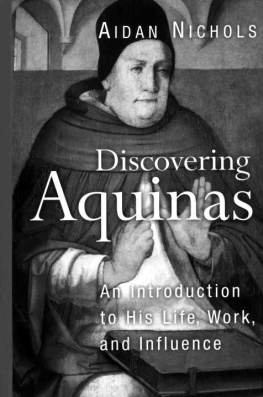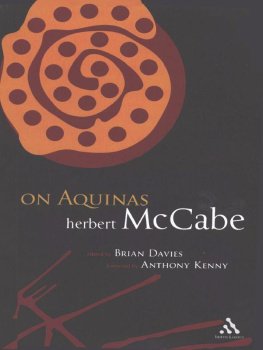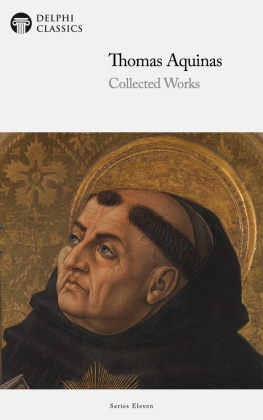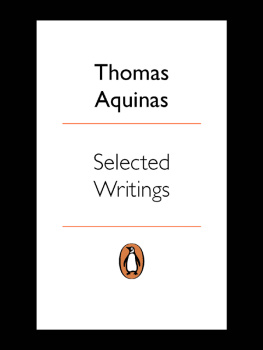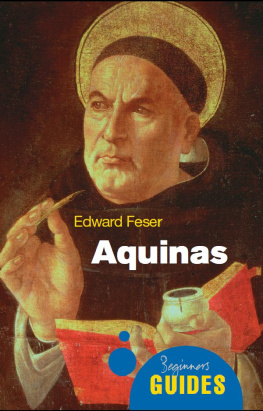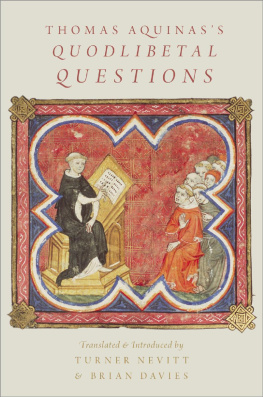The purpose of this series is to provide expository and critical surveys of the work of major philosophers. Each volume contains specially commissioned essays by an international team of scholars, together with a substantial bibliography, and will serve as a reference work for students and nonspecialists. One aim of the series is to dispel the intimidation such readers often feel when faced with the work of a difficult and challenging thinker.
Among the great philosophers of the Middle Ages Aquinas is unique in pursuing two apparently disparate projects. On the one hand, he developed a philosophical understanding of Christian doctrine in a fully integrated system encompassing all natural and supernatural reality. On the other hand, he was convinced that Aristotles philosophy afforded the best available philosophical component of such a system. In a relatively brief career Aquinas developed these projects in great detail and with an astonishing degree of success.
In this volume ten leading scholars introduce all the important aspects of Aquinass thought, ranging from its historical background and dependence on Greek, Islamic, and Jewish philosophy and theology, through the metaphysics, epistemology, and ethics, to the philosophical approach to biblical commentary.
New readers and nonspecialists will find this the most convenient, accessible guide to Aquinas currently in print. Advanced students and specialists will find a conspectus of recent developments in the interpretation of Aquinas.
THE CAMBRIDGE COMPANION TO
AQUINAS
OTHER VOLUMES IN THIS SERIES OF CAMBRIDGE COMPANIONS:
ARISTOTLE Edited by JONATHAN BARNES
BACON Edited by MARKKU PELTONEN
DESCARTES Edited by JOHN COTTINGHAM
EARLY GREEK PHILOSOPHY Edited by A.A. LONG
FOUCAULT Edited by GARY GUTTING
FREUD Edited by JEROME NEU
HABERMAS Edited by STEPHEN K. WHITE
HEGEL Edited by FREDERICK C. BEISER
HOBBES Edited by TOM SORRELL
HUME Edited by DAVID FATE NORTON
HUSSERL Edited by BARRY SMITH and DAVID WOODRUFF SMITH
KANT Edited by PAUL GUYER
LEIBNIZ Edited by NICHOLAS JOLLEY
LOCKE Edited by VERE CHAPPELL
MARX Edited by TERRELL CARVER
MILL Edited by JOHN SKORUPSKI
NIETZSCHE Edited by BERND MAGNUS
PLATO Edited by RICHARD KRAUT
SARTRE Edited by CHRISTINA HOWELLS
SPINOZA Edited by DON GARRETT
WITTGENSTEIN Edited by HANS SLUGA and DAVID STERN
The Cambridge Companion to
AQUINAS
Edited by
Norman Kretzmann
Cornell University
and
Eleonore Stump
St. Louis University

CAMBRIDGE UNIVERSITY PRESS
Cambridge, New York, Melbourne, Madrid, Cape Town, Singapore, So Paulo
Cambridge University Press
The Edinburgh Building, Cambridge CB2 2RU, UK
Published in the United States of America by Cambridge University Press, New York
www.cambridge.org
Information on this title: www.cambridge.org/0521431956
Cambridge University Press 1993
This publication is in copyright. Subject to statutory exception and to the provisions of relevant collective licensing agreements, no reproduction of any part may take place without the written permission of Cambridge University Press.
First published 1993
Reprinted 1994, 1995, 1996, 1997, 1998, 1999
A catalogue record for this publication is available from the British Library
ISBN-10 0-521-43195-6 hardback
ISBN-10 0-521-43769-5 paperback
Transferred to digital printing 2005
CONTRIBUTORS
JAN A. AERTSEN is Professor of Philosophy at the Vrije Universiteit in Amsterdam. He is the author of Nature and Creature: Thomas Aquinass Way of Thought and of many articles on the medieval doctrine of the transcendentals.
DAVID B. BURRELL, C.S.C., holds a dual Professorship in theology and philosophy at the University of Notre Dame. He is the author of Aquinas: God and Action; Knowing the Unknowable God: Ibn Sina, Maimonides, Aquinas, and of many articles on medieval philosophy and theology.
MARK D. JORDAN is an Associate Professor in The Medieval Institute of the University of Notre Dame. His published studies of Aquinas include Ordering Wisdom: The Hierarchy of Philosophical Discourses in Aquinas and The Alleged Aristotelianism of Thomas Aquinas.
NORMAN KRETZMANN is Susan Linn Sage Professor of Philosophy at Cornell University. He has written widely on medieval philosophy and philosophy of religion and was the principal editor of The Cambridge History of Later Medieval Philosophy
SCOTT MACDONALD is Associate Professor of Philosophy at the University of Iowa and the editor of Being and Goodness: The Concept of the Good in Metaphysics and Philosophical Theology His articles include Ultimate Ends in Practical Reasoning: Aquinass Aristotelian Moral Psychology and Anscombes Fallacy.
RALPH MCINERNY is Michael P. Grace Professor of Philosophy and the Director of the Jacques Maritain Center at the University of Notre Dame. Among his many books and articles on Aquinas are Ethica Thomistica: The Moral Philosophy of Thomas Aquinas and Aquinas on Human Action.
JOSEPH OWENS, C.SS.R., an emeritus member of the Pontifical Institute of Mediaeval Studies at the University of Toronto, has contributed many books and articles to the study of Aquinas and of ancient and medieval philosophy, most notably The Doctrine of Being in the Aristotelian Metaphysics and St. Thomas Aquinas on the Existence of God: Collected Papers.
PAUL E. SIGMUND is Professor of Politics at Princeton University and the author of Natural Law in Political Thought and St. Thomas Aquinas on Politics and Ethics.
ELEONORE STUMP is the Robert J. Henle Professor of Philosophy at St. Louis University. She is the author of several books and articles in philosophy of religion and medieval philosophy, including Dialectic and Its Place in the Development of Medieval Logic and Aquinas on the Foundations of Knowledge.
JOHN F. WIPPEL is Professor of Philosophy and Academic Vice-President of the Catholic University of America. His many articles and books on medieval philosophy include Metaphysical Themes in Thomas Aquinas and Truth in Thomas Aquinas.
NORMAN KRETZMANN and ELEONORE STUMP
Introduction
I. AQUINASS REPUTATION
People familiar with Thomas Aquinass work know that he ranks among the greatest philosophers, but the number of such people is still smaller than it should be. Anthony Kenny described and gave one reason for this state of affairs more than a decade ago, when it was even more deplorable than it is now:
Aquinas is little read nowadays by professional philosophers: he has received much less attention in philosophy departments, whether in the continental tradition or in the Anglo-American one, than lesser thinkers such as Berkeley or Hegel. He has, of course, been extensively studied in theological colleges and in the philosophy courses of ecclesiastical institutions; but ecclesiastical endorsement has itself damaged Aquinass reputation with secular philosophers. But since the Second Vatican Council [196265] Aquinas seems to have lost something of the pre-eminent favour he enjoyed in ecclesiastical circles. This wind of ecclesiastical change may blow no harm to his reputation in secular circles. (Kenny 1980a, pp. 2728)
The prognosis with which Kenny ends his diagnosis was being slowly borne out even before he published it. Philosophers, especially those in the Anglo-American tradition, have been bringing Aquinas into secular philosophical discussions. The philosophers of religion among them have, understandably, taken the lead in this process. It was natural that they began looking into Aquinas because of their special interest in his philosophical theology. But Aquinass systematic approach to philosophical theology led him to include in it full treatments of virtually every area of philosophy, regarding which he always shows how in his view the existence and nature of God is related to the areas subject matter. Consequently, philosophers of religion who first read Aquinas in connection with a narrow, twentieth-century conception of their specialization have been taking up appreciative investigations of other aspects of his thought, and they are gradually being joined by philosophers who have no professional interest in religion.
Next page
